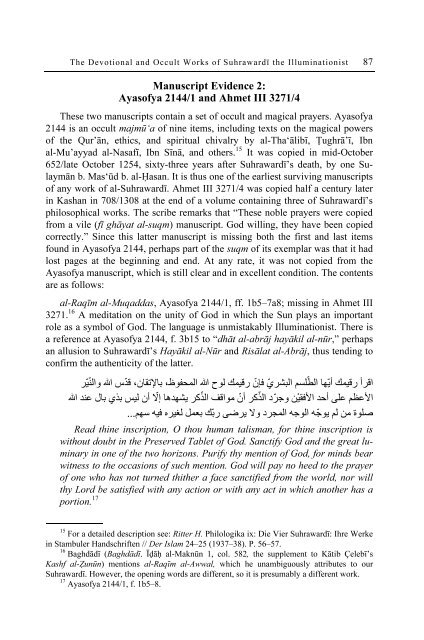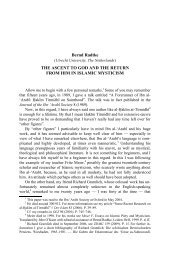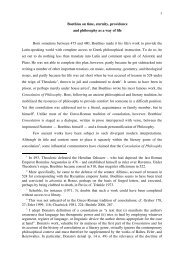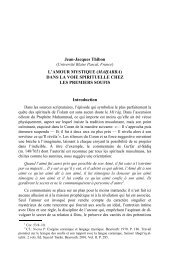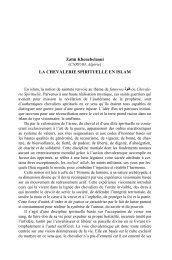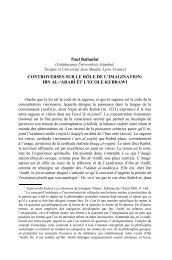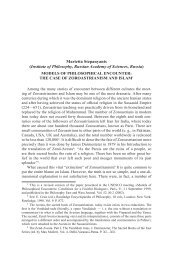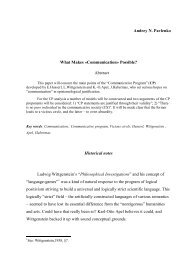The Devotional and Occult Works of Suhrawardī the Illuminationist
The Devotional and Occult Works of Suhrawardī the Illuminationist
The Devotional and Occult Works of Suhrawardī the Illuminationist
You also want an ePaper? Increase the reach of your titles
YUMPU automatically turns print PDFs into web optimized ePapers that Google loves.
<strong>The</strong> <strong>Devotional</strong> <strong>and</strong> <strong>Occult</strong> <strong>Works</strong> <strong>of</strong> <strong>Suhrawardī</strong> <strong>the</strong> <strong>Illuminationist</strong> 87<br />
Manuscript Evidence 2:<br />
Ayas<strong>of</strong>ya 2144/1 <strong>and</strong> Ahmet III 3271/4<br />
<strong>The</strong>se two manuscripts contain a set <strong>of</strong> occult <strong>and</strong> magical prayers. Ayas<strong>of</strong>ya<br />
2144 is an occult majmū‘a <strong>of</strong> nine items, including texts on <strong>the</strong> magical powers<br />
<strong>of</strong> <strong>the</strong> Qur’ān, ethics, <strong>and</strong> spiritual chivalry by al-Tha‘ālibī, Ṭughrā’ī, Ibn<br />
al-Mu’ayyad al-Nasafī, Ibn Sīnā, <strong>and</strong> o<strong>the</strong>rs. 15 It was copied in mid-October<br />
652/late October 1254, sixty-three years after <strong>Suhrawardī</strong>’s death, by one Sulaymān<br />
b. Mas‘ūd b. al-Ḥasan. It is thus one <strong>of</strong> <strong>the</strong> earliest surviving manuscripts<br />
<strong>of</strong> any work <strong>of</strong> al-<strong>Suhrawardī</strong>. Ahmet III 3271/4 was copied half a century later<br />
in Kashan in 708/1308 at <strong>the</strong> end <strong>of</strong> a volume containing three <strong>of</strong> <strong>Suhrawardī</strong>’s<br />
philosophical works. <strong>The</strong> scribe remarks that “<strong>The</strong>se noble prayers were copied<br />
from a vile (fī ghāyat al-suqm) manuscript. God willing, <strong>the</strong>y have been copied<br />
correctly.” Since this latter manuscript is missing both <strong>the</strong> first <strong>and</strong> last items<br />
found in Ayas<strong>of</strong>ya 2144, perhaps part <strong>of</strong> <strong>the</strong> suqm <strong>of</strong> its exemplar was that it had<br />
lost pages at <strong>the</strong> beginning <strong>and</strong> end. At any rate, it was not copied from <strong>the</strong><br />
Ayas<strong>of</strong>ya manuscript, which is still clear <strong>and</strong> in excellent condition. <strong>The</strong> contents<br />
are as follows:<br />
al-Raqīm al-Muqaddas, Ayas<strong>of</strong>ya 2144/1, ff. 1b5–7a8; missing in Ahmet III<br />
3271. 16 A meditation on <strong>the</strong> unity <strong>of</strong> God in which <strong>the</strong> Sun plays an important<br />
role as a symbol <strong>of</strong> God. <strong>The</strong> language is unmistakably <strong>Illuminationist</strong>. <strong>The</strong>re is<br />
a reference at Ayas<strong>of</strong>ya 2144, f. 3b15 to “dhāt al-abrāj hayākil al-nūr,” perhaps<br />
an allusion to <strong>Suhrawardī</strong>’s Hayākil al-Nūr <strong>and</strong> Risālat al-Abrāj, thus tending to<br />
confirm <strong>the</strong> au<strong>the</strong>nticity <strong>of</strong> <strong>the</strong> latter.<br />
رّيّنلاو<br />
ﷲ سّدق ،ناقتلإاب ،ظوفحملا ﷲ حول كميقر ّنإف ّيرشبلا مسلّطلا اھّيأ كميقر أرقا<br />
ﷲ دنع لاب يذب سيل نأ<br />
لاّ<br />
إ اھدھشي ركّذلا فقاوم ّنأ ركّذلا دّرجو نْيقفلأا دحأ ىلع مظعلأا<br />
... مھس هيف هريغل لمعب كّبر ىضري لاو درجملا هجولا هّجوي مل نم ةولص<br />
Read thine inscription, O thou human talisman, for thine inscription is<br />
without doubt in <strong>the</strong> Preserved Tablet <strong>of</strong> God. Sanctify God <strong>and</strong> <strong>the</strong> great luminary<br />
in one <strong>of</strong> <strong>the</strong> two horizons. Purify thy mention <strong>of</strong> God, for minds bear<br />
witness to <strong>the</strong> occasions <strong>of</strong> such mention. God will pay no heed to <strong>the</strong> prayer<br />
<strong>of</strong> one who has not turned thi<strong>the</strong>r a face sanctified from <strong>the</strong> world, nor will<br />
thy Lord be satisfied with any action or with any act in which ano<strong>the</strong>r has a<br />
portion. 17<br />
15 For a detailed description see: Ritter H. Philologika ix: Die Vier <strong>Suhrawardī</strong>: Ihre Werke<br />
in Stambuler H<strong>and</strong>schriften // Der Islam 24–25 (1937–38). P. 56–57.<br />
16 Baghdādī (Baghdādī. Īḍāḥ al-Maknūn 1, col. 582, <strong>the</strong> supplement to Kātib Çelebī’s<br />
Kashf al-Ẓunūn) mentions al-Raqīm al-Awwal, which he unambiguously attributes to our<br />
<strong>Suhrawardī</strong>. However, <strong>the</strong> opening words are different, so it is presumably a different work.<br />
17 Ayas<strong>of</strong>ya 2144/1, f. 1b5–8.


